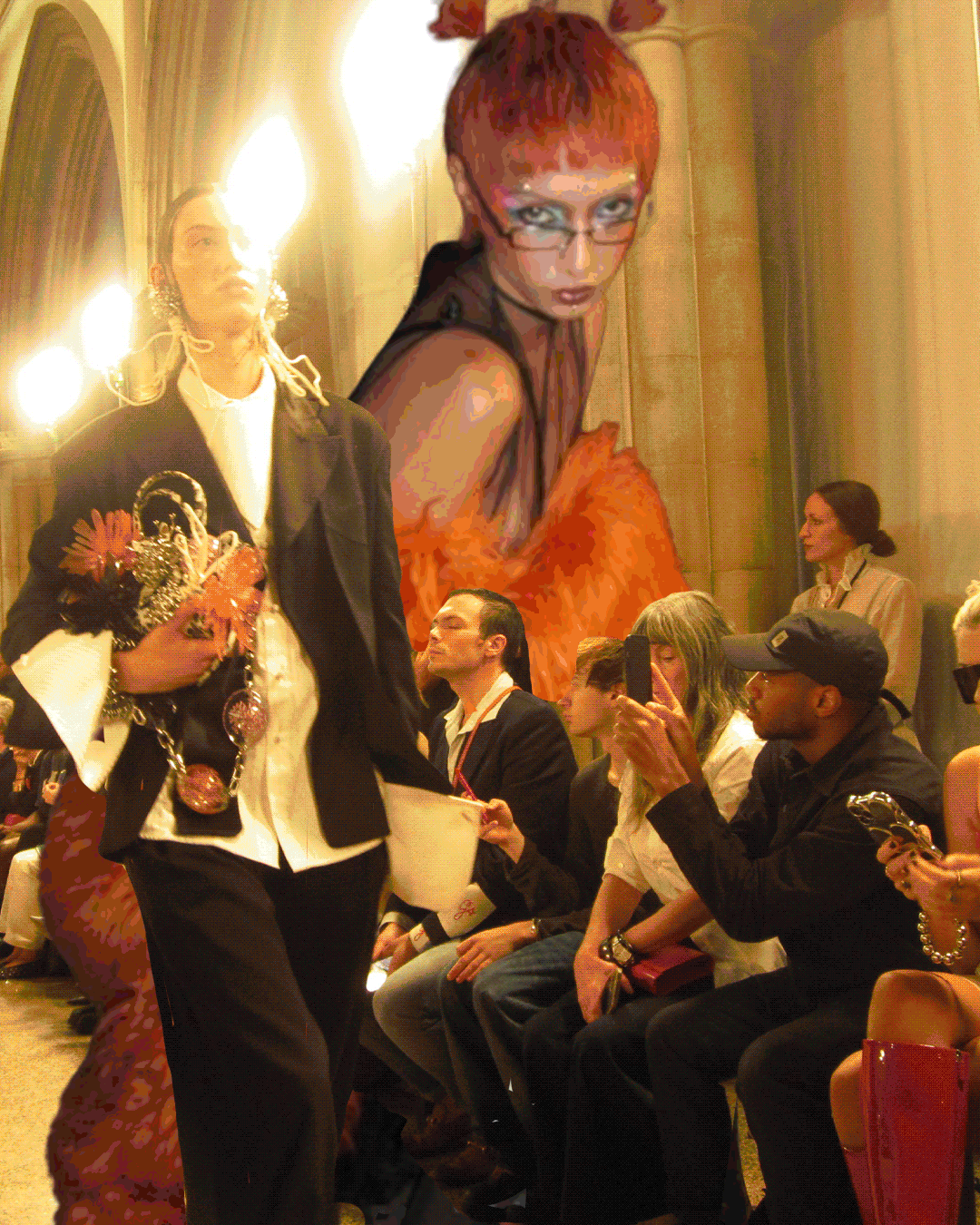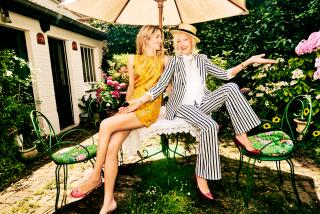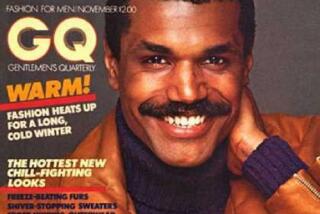An Edwardian era dawns at British Vogue
Reporting from London — The December issue of British Vogue, editor Edward Enninful’s first, lands on newsstands Nov. 10, and it’s a multiracial, multicultural mosaic that spotlights famous Brits — including Queen Elizabeth — and Enninful’s celeb-heavy work family.
Family — and responsibility — figure big in Enninful’s world, including his take on the widening industry scandal that’s seen myriad young women — and men — reveal they were harassed by photographers on and off-set.
Whatever has happened in the past, Enninful said, will cease on his watch.
“Having been a 16-year-old model, I’ve been on set and witnessed things happen. Not to me, but I’ve witnessed things happen to other young people. I was saved because I had great mentors who looked after me, Nick Knight and his wife Charlotte Knight, the photographer Jason Evans and Simon Foxton. I was very lucky. Also, my mother was pretty fierce,” said the editor, who was born in Ghana and moved to London as a child, growing up with his five siblings in Ladbroke Grove.
“All I can do is provide mentors for the very young when they go on shoots. People of power have to show empathy and kindness to the young. I’m very protective of all the vulnerable young kids that go on shoots. I can empathize. I’ve been there.”
Asked about Terry Richardson, one of fashion’s most controversial photographers, whom Condé Nast International dumped last month because of allegations of inappropriate behavior, Enninful said: “I can’t comment on what Terry did or didn’t do, but everyone knows that as a result of what he did — if he did it — these girls need all our love and support. We have to listen to them, and to find a solution to make them safe.”
He was fighting other battles earlier this year, directing the video, “I Am an Immigrant,” while he was working at W Magazine in New York. The video, which features fashion industry figures talking about their personal experiences in the wake of Donald Trump’s travel ban on Muslim countries, went viral.
That attitude ties in with his vision for British Vogue. From behind a glass-topped desk in his sunny corner office at Vogue House, the title’s first black male editor — a straight talker with a quick laugh — said he wants the title to feel inclusive in terms of age, size and gender.
The title, he said, has to represent “real women, and to be reflective of the society we live in. Diversity is very important for me. I want Vogue to feel like a shop that you’re not scared to walk into, one that’s quite welcoming.”
For the cover of his first issue, he’s picked the 25-year-old Adwoa Aboah, Britain’s model du jour, who’s wearing a turban, long diamond earrings and a Marc Jacobs dress, her eyes dusted with bright blue shadow, courtesy of Pat McGrath. The accompanying shoot inside is by Steven Meisel, who hadn’t worked for the title since the early Nineties.
“I love the image — it’s like Britain, with a nod to the colonies,” said Enninful of the elegant, uncluttered cover, which recalls that of an Eighties-era Vogue Italia. “To me, Adwoa represents Britain today. She’s not just a beautiful model, she works with young women, dealing with mental health issues. And she’s biracial, as we say in America. She’s everything I love, and to me she is Great Britain.
Not only is diversity more interesting for Enninful, it’s a natural instinct.
“London welcomed my family, I grew up in Notting Hill in a multicultural society. I lived in two worlds. One was the world of school, Britain, and then I’d go home to another one with different colors and smells. My view of the world has always been very open.”
He said the British focus of his first issue was a clear choice, given where the country finds itself now. “I guess in this day and age of Brexit, there was a fear of the country being seen as xenophobic, and I just wanted to show that Britain is still open and welcoming.
“I wanted to dedicate the issue to the writers, the artists, and also this sort of irreverence that you can only find in Britain — this humor and outlook on life, all the quirks that we have. And also the wealth of talent.”
Features include an essay by Zadie Smith on the humanity of Queen Elizabeth II in the wake of the deadly Grenfell Tower fire, one by Salman Rushdie on the religious faiths in his family and an interview by contributing editor Naomi Campbell of London mayor Sadiq Khan about growing up in south London.
The magazine also takes some big designers back home, describing those journeys with lush portraits and stories: There’s Christopher Bailey shot by the Leeds and Liverpool canal in Yorkshire, Simone Rocha in Dublin, Jonathan Anderson in Belfast and John Galliano by his favorite south London bus stop.
Enninful has also spotlit the 81-year-old actress and former Labour Member of Parliament Glenda Jackson, and the “Game of Thrones” and “Star Wars” actress Gwendoline Christie, whose height — 6-foot-3 — could have stopped her, but didn’t. “She owns who she is, but she hasn’t had it easy,” said Enninful.
He’s introduced technology coverage, brought food back to the Vogue table, with Stella Tennant and designer Hannah Weiland offering their Christmas recipes. He’s also looking at beauty through the broader lens of wellness.
Enninful said he sees digital as a way of enhancing print, especially during key moments on the calendar: The hair and makeup artists on his masthead — including Guido Palau, Val Garland and Pat McGrath — are doing digital takeovers backstage during the shows, and the magazine will be pushing content through Facebook Live, YouTube and Snapchat Discover.
He teased the December issue earlier this week with behind-the-scenes video from the issue’s photo shoots, and said one reason he hired the English film director Steve McQueen as a contributing editor was because he wanted his advice on young directors British Vogue could use for online films.
“I love print, and print will always be around. It’s the most beautiful, curated version, close to a book, where you show the best photography, the best writers, the best fashion. Digital, for me, just helps you enhance. I don’t see them as separate, but almost as one organism. Sometimes a Millennial’s first contact with Vogue will be online,” said Enninful, who put British Vogue on Snapchat Discover, on his first day in the office.
Asked about being a man at the helm of a women’s flagship title, Enninful doesn’t flinch. “I’ve been styling for, what, 27 years,” said the editor, who was named fashion director of i-D when he was 19 years old, and who worked extensively for American and Italian Vogue in those years.
He came to British Vogue from W Magazine, where he was creative and fashion director. “I’ve been dressing women, shooting magazine covers, worked for various Vogues. I’ve just always been a part of the conversation when it came to women. My sex has never had anything to do with it,” he said.
Enninful is mining his past for his new role: His masthead may be busting forth with celebrities, what with Kate, Naomi, Adwoa, Val Garland, Sam McKnight and Charlotte Tilbury all named as contributors, and McGrath serving as beauty editor at large, but to him they’re just old mates.
“I did Charlotte’s first shoot. To me, she’s just Charlotte. Pat and I started together in London, Guido, I’ve known him forever. We’ve all come up together, we’ve all been present in each other’s work over the years. They are the best at what they do. I discovered Pat McGrath when she was a music makeup artist, and I introduced her to fashion. I worked with Charlotte when she was first starting with Mert [Alas] and Marcus [Piggott]. It’s very important to have the best.”
Parent Condé Nast Britain said Enninful has gotten off to a strong start with the December issue, which has closed up 29 percent in net display revenue, the best December result since 2008. Display pages were up 40 percent year-over-year compared with December 2016, 194 versus 154.
New Vogue or not, the greater advertising environment remains hostile to the printed page. In the January-to-June period, the print edition of British Vogue fell 1.5 percent year-over-year to 183,300, while digital declined 25.5 percent to 6,721, according to the U.K.’s Audit Bureau of Circulations. The numbers reflecting Enninful’s first efforts won’t be visible until next August, when the January-to-June 2018 ABC numbers are released.
Condé Nast is also a company in transition, closing or downsizing titles, laying off staff, trying to replace the marquee editors at Vanity Fair and Glamour. Since the death of Samuel Irving “S.I.” Newhouse Jr., press baron and Condé guardian, rumors of a sale have resurfaced.
Enninful remains bullish despite it all. “People always want to read Vogue. There’s a healthy circulation. So long as you keep surprising people, reflecting people, they will always want to see what’s going on in the magazine. And I believe in print. I’ve seen changes, but I believe a strong product like Vogue will always exist. We have to move with the times, so we have the digital to support that, but the actual magazine isn’t going anywhere anytime soon.”
ALSO
Pietro Beccari named CEO of Dior in LVMH reshuffle
Nine for 10: Our favorite Image section cover looks from the past decade
Telfar Clemens of Telfar wins 2017 CFDA/Vogue Fashion Fund







